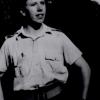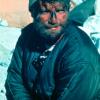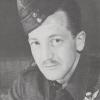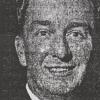When I left the Old Vicarage I had no clear idea of where I might go. Despite Kate ter Horst' s kindness and calm I had a great urge to escape from her house. It was over-full, terribly soiled and beginning to smell. I had a great feeling of guilt whenever she talked to me knowing how neat her comfortable home must have been before its invasion by too many blood stained, grimy and exhausted soldiers. On a more practical note I realised that I could expect no more meaningful medical attention, little water and practically no food. Moreover I was always conscious of the extensive area of glass that separated me from the hostile outer world.
Thus I felt great relief as soon as I entered the garden. The air was fresh and clean and an unexplored world lay before me. I headed slowly away from the church and towards the North-East. I met no one and saw no one. I travelled very slowly keeping always towards the friendly shelter of trees. At one point I crossed a road and soon after I sat down to think and to make a meaningful assessment of my position.
I began by emptying my pockets. In one, I found as I knew I would, a handsome pocket knife, a shilling and a piece of string. These had been given to me by my grandfather some 5 years earlier when on the outbreak of war, I had decided to join the army. They were, he explained, items that no good soldier would ever be without. It was reassuring to find then present and correct under the trees of Oosterbeek. More importantly I was still wearing my military equipment - a web belt, 2 ammunition pouches and a water bottle - all now alas quite empty. However, I had hung on like grim death to my small pack'. This contained shaving and washing gear; spare socks; clean underclothes; knife, fork and spoon, and a mess tin. I realised that I was far from destitute. Further foraging revealed a bag of boiled sweets and a forgotten bar of chocolate. At this I felt positively rich.
I remember after 49 years placing one boiled sweet in my mouth in an effort to assuage my thirst but my mouth was so dry and lacking in saliva that it was like sucking a stone - it took an uncomfortably long time to disappear. Meanwhile I continued my slow journey and eventually reached a house in a small clearing. It was white, looked friendly and I approached it from the rear where 3 or 4 steps led down to what was probably a cellar door. I sat on the steps.
I remained there for a considerable time listening hard for friendly voices. Various noises told me that the house was occupied but none of sufficient volume or clarity to identify the occupants. Eventually one expletive phrase, much louder than the rest and containing a much used army swear word convinced me that I had located compatriots. I knocked loudly on the door which eventually opened cautiously to reveal a young NCO of the Glider Pilot Regiment carrying a business like machine carbine. I explained where I had come from and was invited in.
There were 4 of them in that snug cellar. I noticed at once a small petrol cooker on which a large container of water was almost at the boil. Whilst we exchanged mutual greetings and experiences one of them went carefully through the ritual of making army tea. He turned politely to me first and enquired if I had a mess tin or mug. Never had a mess tin been so quickly produced and never had tea tasted so delicious. It was the first proper drink I had had in 4 days and when offered a second helping, I was brazen rather than shy. Water, apparently, was not a problem.
The house possessed its own indoor pump. A further pleasant surprise awaited as darkness began to fall. A good, thick stew replaced the water on the cooker and once more I was invited to the head of the queue. Rations, no doubt secreted in odd corners of an underladen glider, were not yet a problem. When it grew dark I was allotted a bed space cum fire position on a stone ledge in the cellar. It was surmounted by a long but shallow window, well above the ledge so that while offering vision to the outside world, my body when prone was well protected by solid looking stonework, a very pleasing architectural feature. The ledge was a little harder than my deserted stretcher but my small pack made a good pillow and I was soon asleep.
My luck so far had been too good to be true and certainly too good to last as I was to discover when dawn broke. Instead of the alert bustle that normally accompanies this hour; an hour favoured by attackers and therefore a period of maximum 'stand to’ by soldiers, the house was strangely quiet and the cellar deserted. And outside, instead of the constant racket of exploding shells which had been non-stop for over a week, a strange and sinister silence prevailed. What had happened? I decided to investigate.
I sat up and listened. I could hear no sounds from my new friends in any upper rooms of the house. I then looked out of the window and to my astonishment watched a section of German soldiers marching un-opposed and very purposefully southwards toward the river. I realised then that the perimeter had either been breached or had withdrawn.
It was some days later that I learned that General Urquhart had given orders for a withdrawal over the river and that wounded were to be left behind. All doctors and padres would also remain to tend them. However on that break of day I was puzzled and confused. Why had my comrades not told me they were leaving? Later I realised it was probably out of kindness but that morning I felt lonely and betrayed. I also had a German rifle by my side and a bandolier of German ammunition around my neck. It seemed sensible to get rid of these so I slid them across the cellar floor. I then unzipped my smock and unbuttoned my shirt to display an ugly looking wound, lay back and feigned death.
I did this because I could hear noises and several German voices elsewhere in the house. I realised that they would soon inspect the cellar. Presently footsteps echoed on the stairs and I heard a pair of German voices. I lay very still. I could follow their progress around the room and knew exactly when I was spotted. One approached and shook my shoulder not urgently saying "Wake up Tommy". I remained in a death like trance while they discussed the situation in German in which the word “Kaput” received some emphasis. I decided then it was time to resume life and to their apparent relief re-opened my eyes. The English speaker then enquired about my wounds and I pointed to my blood stained trousers. I was told ‘Wait’.
A few minutes later a young lance corporal arrived with 2 soldiers and a stretcher. I was carried from the house to a nearby roadside and placed among a party of other wounded stretcher cases under armed guard. Presently a small truck appeared and 5 of us were helped into its open baggage compartment. We were soon on our way to a hospital we were told, at Apeldoorn seven miles north of Arnhem.
One of the saddest experiences of my whole life was that slow drive through Oosterbeek. Swollen corpses littered every street, mostly military of both contestants, but a distressingly large number of innocent civilians, cut down in the fighting. Ruined and smouldering houses lined the route and generally I was horrified at the damage and devastation that the fighting had caused. How, I wondered, could the Dutch ever forgive us?
I felt all the humiliation of a prisoner of war and the shame, remembering the kindness, help and bravery of the inhabitants of Oosterbeek, to have been partially instrumental in bringing such damage and despair to a once beautiful area. I forgot that we had also perhaps brought hope.
One feature of the battle had been the lightness of support from the overwhelmingly superior allied fighter aircraft. This was not the fault of the pilots but more a function of weather and inadequate ground to air control. But where had all the fighters gone? We were soon to find cut! On the straight, tree lined road to Apeldoorn, we were attacked by British fighter aircraft most of the way. Our German escorts were clearly well used to this treatment. They were always alert to dangers from the sky and at the slightest hint of trouble drove to the shelter of the nearest tree and were swiftly out of the vehicle and into a ditch. Nevertheless they kept a close watch on their prisoners and often encouraged us with the cheerful message - 'Don't worry. They won't hit you. They are your aircraft'.
Eventually we reached our destination, a barracks in Apeldoorn at which our airborne doctors were already arriving. Assisted by Dutch nurses we were given medical care and a chance to rest and clean up. I stayed there for perhaps 2 days and then left by train one night deep into Germany. A well established officers’ prisoner of war camp near Hannover was my destination. There I was to spend an interesting 6 months. Many of its occupants, mostly British but a sprinkling of French and many other races, had already endured several years. It was commanded inside the elaborate perimeter fence with its search lights and heavily manned watch towers, by the Senior British Officers and run on army lines.
The Germans only interfered in our activities twice daily. Then we paraded in 5 ranks to be counted. It was relatively easy to disrupt this counting procedure and if the weather was fine and warm it became the day's main preoccupation. It was heartening to see the alarm and despondency of our captors if a count revealed that 2 officers had 'escaped!' It was even more amusing to note their frustration when a count revealed that our ration strength, without any female assistance, had increased by 3 overnight. Despite these distractions life in a prison camp tended to be boring rather than a threat to mental health.
Food, or the lack of it, formed the main substance of all civilised communication. Exercise was taken mainly by walking vigorously just inside and around the perimeter wire if only to keep the guards alert and uneasy. Debating clubs; amateur dramatics, education and many other hobbies abounded and were well run. There was also a well stocked library. Thus life could have been much worse. Our life blood was the daily influx of news from the BBC through a secret and well hidden radio, with 2 others in reserve should the first ever be located. This daily message was propagated by special messengers each night through the various barrack rooms and allowed us to keep in close contact with the progress of the war. Indeed we found that we were often far better informed than our German captors.
Letter writing too filled many hours but at this late stage of the war I was subsequently to discover that none of mine reached its location. Those latter stages of the war seemed to pass with agonising slowness until one day in early April one officer claimed to have heard the sounds of gunfire. He was initially ridiculed but soon we could all hear it and excitement was rife. By this time most of the camp guard had deserted. The remaining officers declined to surrender the 'Keys' and manned the lights and machine guns in the watch tower. They could, they said, only surrender to an armed and organised relieving force. Soon this wish was granted.
A large and bemused negro sergeant in a jeep had strayed miles away from his US unit. He was hopelessly lost. Hailed by friendly voices from behind the wire he was quickly steered to the main gate where a formal handover of the camp ensued. By this time normal administration had broken down and no rations were forthcoming.
It was good therefore that troops arrived in force within 48 hours and we were quickly flown to Brussels. 48 hours of medical checks and cleaning up followed, with speedy repatriation to the UK. I arrived home on my mother's birthday - a happy event since none of my many letters to her had arrived and her last news was an army telegraph saying simply 'missing believed killed'.
Courtesy of Maj Gen Dair Farrar-Hockley
Read More




Latest Comments
There are currently no comments for this content.
Add Comment
In order to add comments you must be registered with ParaData.
If you are currently a ParaData member please login.
If you are not currently a ParaData member but wish to get involved please register.